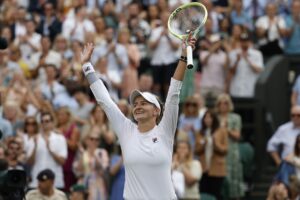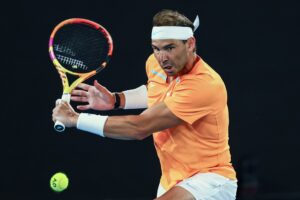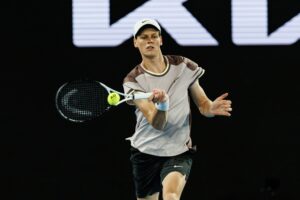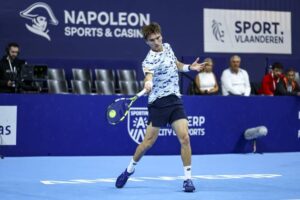Rafael Nadal seems set for another dominant clay court season after clinching his 11th Monte Carlo Masters, without dropping a set.
He is currently riding a 40-set winning streak, which looks all the more impressive when you consider the competition he has faced thus far.
Nadal made a tough draw look easy by dropping just two games against Dominic Thiem and breezing past Grigor Dimitrov and Kei Nishikori.
His career statistics on clay are simply astonishing. Here are just a few.
- Longest winning streak on a single surface- 81 straight victories between 2005-2007.
- 11 Monte Carlo Masters, 9 Barcelona Opens, and 7 Rome Masters.
- Won at least one of the three major Masters 1000 events on clay (Monte Carlo Masters, Italian Open, and Rome Masters) every year between 2005-2014.
- 10 French Opens, three of which came without losing a single set.
- Only player in history to go undefeated in 10 straights Grand Slam Finals on a single surface.
- 79-2 record at the French Open and a 92% career win-loss record on clay.
Nadal is without a doubt the most dominant player on a single surface in the history of tennis.
Novak Djokovic, Roger Federer, Dominic Thiem, and even Kei Nishikori have all managed to beat him on clay in smaller events, but beating him on the red dirt over five sets has proved almost impossible for over a decade.
So what is it about the Spaniard’s game that makes him so good on clay?
Patience and Consistency
When experts break down why Nadal is so dominant on clay they tend to focus on his heavy, looping forehand and incredible athleticism.
However, Nadal deserves a lot more credit for his tactical brilliance on the red dirt. His ability to dictate the play and cleverly construct each point is one of his biggest strengths.
Clay is a much slower surface than hard or grass courts, which means that even the most powerful players on the tour have to work harder to produce a winner.
Players who normally blast their way to victory with powerful groundstrokes on fast courts have to be much more patient and consistent on clay as the points are much longer.
They have more time to play their shots, but they have to treat it like a chess match and wait for the right moment to pull the trigger.
No one does this better than Nadal. How often have you seen him throw a point away because he grew impatient? Exactly, he refuses to miss! The longer the rally goes, the more comfortable he becomes and the more frustrated his opponents get.
He may be aggressive, but he never rushes things and always seems to know exactly when to let rip. His heavy topspin also means that his shots loop well over the net, giving him plenty of margin for error.
Athleticism & Mental Toughness
Nadal’s athleticism is a significant factor in his success on the red dirt as he can outlast almost anyone.
The points are so long and punishing on clay that many of the matches, particularly at the French Open, seriously test players’ fitness and strength of will. No one on the tour loves a gritty battle more than Nadal, whose mental toughness and conditioning are unparalleled.
Nadal’s speed and footwork allow him to extend every point as he retrieves shots that no one else can. By blunting his opponents’ offense, he forces them to engage in long rallies with him.
His opponents have to work harder than they would against anyone else to make any in-roads against him. Some players are up for the challenge, but they struggle to sustain the high level of skill, fitness and patience required for an entire match against Nadal. Whether it takes him one hour or four, he always seems to wear his opponents down physically and mentally.
Nadal therefore comes into every match on clay with a huge psychological advantage over his opponents as they know that every point will be a vicious grind.
There’s nothing worse than hitting a shot that would normally be a clean winner and seeing the ball come right back at you with interest. Try experiencing that over and over again, for hours.
Topspin Forehand
Heavy topspin is extremely effective on clay and Nadal’s forehand is arguably the heaviest groundstroke in the game.
His shots get an extra kick on clay as they dig into the surface and bounce up higher and at a greater angle than on faster surfaces.
His opponents often have to hit the ball from shoulder-height as a result. These high balls make it extremely difficult for them to generate speed, depth, power and angles with their shots.
Nadal’s topspin also forces them well behind the baseline, which puts them seriously on the back foot as the surface is so slippery that it’s tough to recover from this position.
With his opponents on the defensive, Nadal can control the rest of the point, breaking them down shot by shot as he patiently creates openings to rip a trademark forehand winner.
The extreme spin he generates also allows him to create unique angles that give him a further edge in longer rallies.
These angles are difficult for right-handers to deal with, particularly on the backhand side as his cross-court forehand bounces at an acute angle away from their backhand.
Nadal can hit more forehands on clay than any other surface because the ball comes at him so slowly that he can run around his backhand and hit an off-forehand or whip the ball down the line.
Given that it’s arguably the most devastating shot in the game, it’s almost unfair on everyone else that Nadal can hit so many forehands on clay.
It’s more than just his forehand
It’s hard to see Nadal losing on his favourite surface any time soon, especially when you consider all of these advantages. His whipping forehand is a major factor, but his ability to take charge of the point, out-think and out-last his opponents is ultimately what separates him from the pack.






